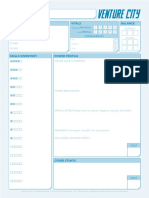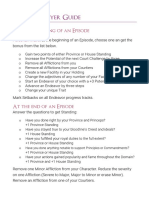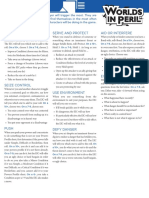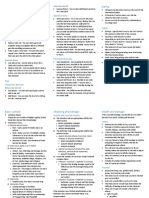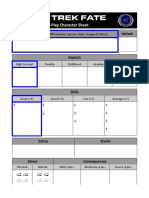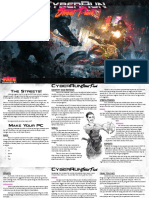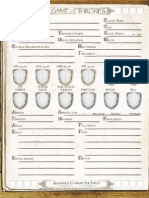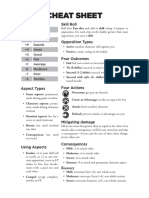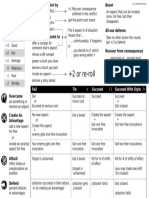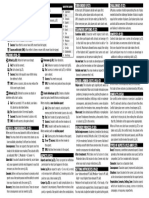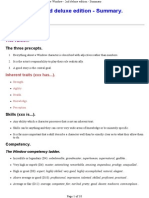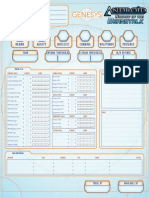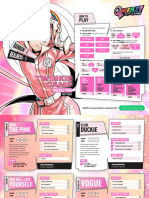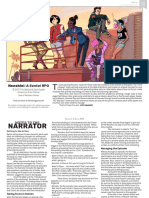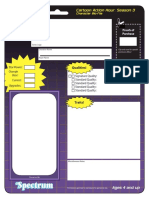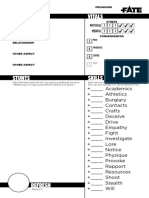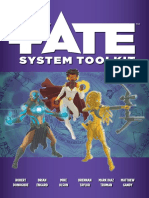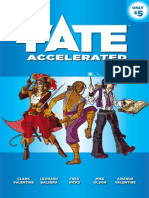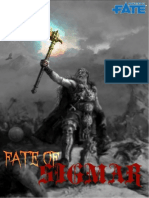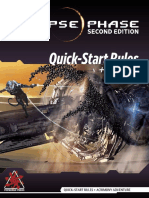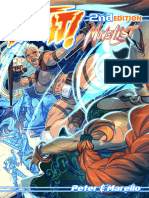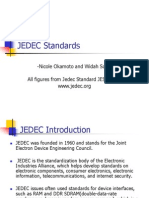0 ratings0% found this document useful (0 votes)
277 viewsFate Core GM Screen PDF
Fate Core GM Screen PDF
Uploaded by
Thor AntagonistaCopyright:
© All Rights Reserved
Available Formats
Download as PDF, TXT or read online from Scribd
Fate Core GM Screen PDF
Fate Core GM Screen PDF
Uploaded by
Thor Antagonista0 ratings0% found this document useful (0 votes)
277 views3 pagesOriginal Title
Fate-Core-GM-Screen.pdf
Copyright
© © All Rights Reserved
Available Formats
PDF, TXT or read online from Scribd
Share this document
Did you find this document useful?
Is this content inappropriate?
Copyright:
© All Rights Reserved
Available Formats
Download as PDF, TXT or read online from Scribd
Download as pdf or txt
0 ratings0% found this document useful (0 votes)
277 views3 pagesFate Core GM Screen PDF
Fate Core GM Screen PDF
Uploaded by
Thor AntagonistaCopyright:
© All Rights Reserved
Available Formats
Download as PDF, TXT or read online from Scribd
Download as pdf or txt
You are on page 1of 3
Four
Outcomes (p. 132): • Severe: overcome Fantastic (+6), one whole
scenario.
• Fail: Fail your action or succeed at a major cost.
The Ladder (p. 9) • Tie (0 Shifts): Succeed at minor cost.
+8 Legendary • Succeed (1—2 shifts): Succeed with no cost.
Aspect Types (p. 57)
• Succeed with style (3+ shifts): succeed with
+7 Epic additional benefit. • Game aspects: permanent, made during game
creation
+6 Fantastic • Character aspects: permanent, made during
+5 Superb Four Actions (p. 134) character creation
• Situation aspects: last for a scene, until
+4 Great
+3 Good
o Overcome: get past an obstacle. •
overcome, or until irrelevant
Boosts: last until invoked one time
• Consequences: last until recovered
+2 Fair
+1 Average
C Create an Advantage: Invoke an aspect for free.
+0 Mediocre Invoking Aspects (p. 68)
-1 Poor
A Attack: Harm another character. Spend a fate point or free invoke. Choose one:
• +2 to your skill roll
-2 Terrible D Defend: prevent attacks or advantages on you. • Reroll all our dice
• Teamwork: +2 to another character’s roll versus
relevant passive opposition
• Obstacle: +2 to the passive opposition
Game Time (p. 194) Free invokes stack with a paid one and each other.
• Exchange: time for everyone to get a turn
Mitigating Damage (p. 160)
• Scene: Time to resolve a situation Fill in one stress box greater than or equal to the value of
an attach, take one or more consequence, or fill in one
• Session: a single sitting
stress box and take consequences—if you can’t do one of Compelling Aspects (p. 71):
• Scenario: An Episode Accept a complication for a fate point.
these three things, you’re taken out.
• Arc: A Season • Event-based: You have _____ aspect and are in
• Campaign: The entire game in a particular _____ situation, so it makes sense that,
setting unfortunately, _____ would happen to you.
Consequences (p. 162) Damn your luck.
• Mild: -2 to attack value • Decision-based: You have _____ aspect in
Skill Roll (p. 130) • Moderate: -4 to attack value _____ situation, so it makes sense that you’d
Roll four Fate dice and add to skill rating. Compare to • Severe: -6 to attack value decide to _____. This goes wrong when _____
opposition. For each step on the ladder greater than your • Extreme: -8 to attack and permanent character happens.
aspect
opposition, you earn a shift.
Refresh (p. 80)
Opposition types (p.131) Recovery (p. 164) At the start of a new session, you reset your fate points to
• Mild: overcome Fair (+2), one whole scene your refresh rate. If you ended the last session with more
• Active: another character rolls against you.
• Moderate: overcome Great (+4), one whole points, you keep the extra. At the end of a scenario, you
• Passive: A static rating on the ladder.
session. reset to your refresh rate no matter what.
Spending Fate Points (p. 80): Earning Fate Points (p. 81) • Succeed with Style: Create or discover the
Spend fate points to: aspect, get two free invocations on it.
• Earn fate points when you:
• Invoke an aspect • Create an advantage on an aspect you already
• Accept a compel
know about (FAE, p. 15):
• Power a stunt • Have your aspects invoked against you
• Fail: No additional benefit.
• Refuse a compel • Concede a conflict.
• Tie: Generate one free invocation on the
• Declare a story detail
aspect.
• Succeed: Generate one free invocation on
Dice Results (FAE, Page 18) the aspect.
Challenges (p.147) Result = Dice Roll + Approach bonus + • Succeed with Style: Generate two free
• Each obstacle or goal that requires a different Bonuses from stunts + Bonuses from invocations on the aspect.
skill gets an overcome roll. Invoked Aspects • Overcome (FAE, p. 16):
• Interpret failure, costs, and success of each roll to • Fail: Fail, or succeed at a serious cost.
determine final outcome. • Tie: Succeed at minor cost.
Outcomes (FAE, Page 13) • Succeed: You accomplish your goal.
• Fail: Your Result is lower • Succeed with Style: You accomplish your
Contests (p. 150) • Tie: Your Result is equal goal and generate a boost.
• Contesting characters roll appropriate skills. • Success: Your Result is higher by 1 or 2 • Attack (FAE, p. 17):
• If you got the highest result, you score a victory. • Success with Style: Your Result is higher by 3 • Fail: No effect.
• If you succeed with style and no one else does, or more. • Tie: Attack doesn’t harm the target, but you
then you get two victories. gain a boost.
• If there’s a tie for the highest result, no one gets a • Succeed: Attack hits and causes damage.
• Succeed with Style: Attack hits and causes
victory, and an unexpected twist occurs. Setting Target numbers (FAE, p. 37) damage. May reduce damage by one to
• The first participant to achieve three victories
• Easy Task: Mediocre (+0) – or success without a generate a boost.
wins the contest.
roll • Defend (FAE, p. 17):
• Moderately Difficult: Fair (+2) • Fail: You suffer the consequences of your
• Extremely Difficult: Great (+4) opponent’s success.
Conflicts (p. 154) • Impossibly Difficult: Go as high as you think • Tie: Look at your opponent’s action to see
• Set the scene, describing the environment the makes sense. The PC will need to drop some fate what happens.
conflict takes place in, creating situation aspects points and get lots of help to succeed, but that’s • Succeed: Your opponent doesn’t get what
and zones, and establishing who’s participating fine. they want.
and what side they’re on. • Succeed with Style: Your opponent doesn’t
• Determine the turn order. get what they want, and you get a boost.
• Start the first exchange: Actions (FAE, p. 14) • Getting Help (FAE, p. 17):
• On your turn, take an action and then resolve • An ally can help you perform your action.
• Create an advantage when creating or
it. • When an ally helps you, they give up their
discovering aspects (FAE, p. 14)
• On other people’s turns, defend or respond action for the exchange and describe how
• Fail: Don’t create or discover, or you do but
to their actions as necessary. they help.
your opponent (not you) gets a free
• At the end of everyone’s turn, start again invocation. • You get a +1 for each ally that helps in this
with a new exchange. way. GM may place limits on how many
• Tie: Get a boost if creating new, or treat as
• Conflict is over when everyone on one side has success if looking for existing may help.
conceded or been taken out.
• Succeed: Create or discover the aspect, get a
free invocation on it.
Turn Order (FAE, p. 21) more fate points for giving in (page 24). • May be invoked once (for free), then they
vanish. May be eliminated by an opponent
• Physical Conflict: Compare Quick
using an overcome action.
approaches—the one with the fastest reflexes
goes first. Approaches (FAE, p. 18) • Unused boosts vanish at the end of the scene.
Mental Conflict: Compare Careful • Consequences (page 23)
• • Careful: When you pay close attention to detail
approaches—the one with the most attention to and take your time to do the job right. • Used to absorb shifts from successful attacks.
detail senses danger. • Clever: When you think fast, solve problems, or • May be invoked by your opponents as if they
• Everyone else goes in descending order. Break account for complex variables. were situation aspects.
ties in whatever manner makes sense, with the • Flashy: When you act with style and panache.
GM having the last word. • Forceful: When you use brute strength.
• The GM may choose to have all NPCs go on • Quick: When you move quickly and with Fate Core and Fate Accelerated Edition © 2013
the turn of the most advantageous NPC. by Evil Hat Productions, LLC. This is a fan-
dexterity.
created, not-for-profit GM Screen.
• Sneaky: When you use misdirection, stealth, or
deceit.
Stress & Consequences (FAE, p. 22)
• Severity of hit (in shifts) = Attack Roll –
Defense Roll Aspects (FAE, p. 25)
• Stress Boxes: You can check one stress box • Invoke (FAE, p. 27):
to handle some or all of the shifts of a single • Spend a fate point to get a +2 or a reroll for
hit. You can absorb a number of shifts equal yourself, or to increase difficulty for a foe by
to the number of the box you check: one for 2.
Box 1, two for Box 2, three for Box 3. • Compel (FAE, p. 28):
• Consequences: You many take one or more • Receive a fate point when an aspect
consequences to deal with the hit, by complicates your life.
marking off one or more available • Establish facts (FAE, p. 29):
consequence slots and writing a new aspect • Aspects are true. Use them to affirm details
for each one marked. about you and the world.
• Mild = 2 shifts
• Moderate = 4 shifts
• Severe = 6 shifts
• Recovering from Consequences: Types of Aspects
• Mild consequence: Clear it at end of • Character Aspects (page 25)
the scene. • Written when you create your character.
• Moderate consequence: Clear it at the • May be changed when you reach a milestone
end of the next session. (page 33).
• Severe consequence: Clear it at the end • Situation Aspects (page 26)
of the scenario. • Established at the beginning of a scene.
• Taken Out: If you can’t (or decide not • May be created by using the “create an
to) handle the entire hit, you’re taken advantage” action.
out and your opponent decides what • May be eliminated by using the overcome
happens to you. action.
• Giving In: Give in before your • Vanish when the situation ends.
opponent’s roll and you can control how • Boosts (page 26)
you exit the scene. You earn one or
You might also like
- Venture City Character SheetDocument1 pageVenture City Character SheetJohn ParkerNo ratings yet
- GeneFunk 2090 Character Sheet (Fillable)Document3 pagesGeneFunk 2090 Character Sheet (Fillable)Jordan MitchellNo ratings yet
- SU 2.0.6 GuideDocument26 pagesSU 2.0.6 GuideAlejandro Milla25% (4)
- Defiant RPG - Player Guide (Electronic Version) XDocument4 pagesDefiant RPG - Player Guide (Electronic Version) XXosé Lois PérezNo ratings yet
- Smallville RPGDocument93 pagesSmallville RPGJacob McGrath100% (1)
- Worlds in Peril - MovesDocument3 pagesWorlds in Peril - Movestcherban100% (1)
- Compiled Errata PTUDocument17 pagesCompiled Errata PTUPlemithNo ratings yet
- SWADE Savage Worlds Adv Ed Core Rules (17047683) PDFDocument1 pageSWADE Savage Worlds Adv Ed Core Rules (17047683) PDFpapatroll0% (1)
- Tenra Bansho Zero Cheat Sheet PDFDocument3 pagesTenra Bansho Zero Cheat Sheet PDFAira-Nikita Petersen VedgrenNo ratings yet
- Star Trek Fate: Quick-Play Character SheetDocument2 pagesStar Trek Fate: Quick-Play Character SheetedemaitreNo ratings yet
- Battle of WaterlooDocument13 pagesBattle of WaterlooAnda AdamsNo ratings yet
- Fate ShadowrunDocument5 pagesFate ShadowrunArturo Origel100% (2)
- Sword & Sorcery 3.5 - A Game of Thrones RPG - Character SheetDocument1 pageSword & Sorcery 3.5 - A Game of Thrones RPG - Character SheetRavenach0% (1)
- Fate Core Cheat Sheet and Vet Guide PDFDocument4 pagesFate Core Cheat Sheet and Vet Guide PDFOthon CabreraNo ratings yet
- FATE Accelerated ScreenDocument2 pagesFATE Accelerated ScreenKevin PerrineNo ratings yet
- Fae GM ScreenDocument3 pagesFae GM ScreenMark 'Mcduff' StevensonNo ratings yet
- Fate GM ScreenDocument3 pagesFate GM ScreenDavid LasryNo ratings yet
- Fate - Core Cheat Sheet PDFDocument1 pageFate - Core Cheat Sheet PDFJennifer NavarroNo ratings yet
- Fate RPG Actions GridDocument1 pageFate RPG Actions GridVikshadeNo ratings yet
- Fate Core RPG GM ScreenDocument3 pagesFate Core RPG GM ScreenAnonymous tG1XMdli100% (5)
- Fate Condensed Summary HandoutDocument1 pageFate Condensed Summary HandoutJosé BorgesNo ratings yet
- Quick Start GuideDocument7 pagesQuick Start GuideWhite WolfNo ratings yet
- The Window - 2nd Deluxe Edition - Summary.: Official RulesDocument10 pagesThe Window - 2nd Deluxe Edition - Summary.: Official Rulessirkay2006No ratings yet
- Trinity Aeon Character Sheet (Printer Friendly) PDFDocument2 pagesTrinity Aeon Character Sheet (Printer Friendly) PDFSilvano PradoNo ratings yet
- Shadow of The Beanstalk Character SheetDocument3 pagesShadow of The Beanstalk Character Sheetno0% (1)
- QUEERZ! Character - Twinkie CampDocument2 pagesQUEERZ! Character - Twinkie CampRobert ArndtNo ratings yet
- 1.3 Open Playtest ManuscriptDocument316 pages1.3 Open Playtest Manuscriptjosec99.jccNo ratings yet
- Legend of Five Rings Character Sheet (Page 1)Document1 pageLegend of Five Rings Character Sheet (Page 1)theevilstNo ratings yet
- Henshin Basic PlaysetDocument12 pagesHenshin Basic PlaysetJosé Ricardo Valente MendesNo ratings yet
- Cartoon Action Hour: Season 3: Character Bio-FileDocument1 pageCartoon Action Hour: Season 3: Character Bio-FileH V CNo ratings yet
- Leverage The Quickstart JobDocument18 pagesLeverage The Quickstart Jobmiller100% (1)
- Fate of The Galaxy v2.2Document156 pagesFate of The Galaxy v2.2Conan BrasherNo ratings yet
- Fate Condensed Character Sheet FormfillableDocument1 pageFate Condensed Character Sheet FormfillableggNo ratings yet
- Tenra Bansho Zero - Armor Rider Sample CharacterDocument1 pageTenra Bansho Zero - Armor Rider Sample CharacterQunariNo ratings yet
- Ki Khanga Pre Made CharactersDocument20 pagesKi Khanga Pre Made CharactersJorge dos Santos ValpaçosNo ratings yet
- MtA - PBTADocument5 pagesMtA - PBTAMestre Storyteller0% (1)
- Leverage Sheets OnesevenDocument6 pagesLeverage Sheets OnesevenStephen SandersNo ratings yet
- Savage Mass EffectDocument35 pagesSavage Mass EffectLuke SimulacrumNo ratings yet
- Fate System ToolkitDocument186 pagesFate System ToolkitRicardo EstevesNo ratings yet
- Savage Worlds - Character Creation and Leveling TrackerDocument1 pageSavage Worlds - Character Creation and Leveling TrackerTerry RW Whisenant100% (1)
- Fate Accelerated Electronic EditionDocument50 pagesFate Accelerated Electronic EditionMiguel HernandezNo ratings yet
- Streets of Mos EisleyDocument15 pagesStreets of Mos EisleySentientGames100% (1)
- Technoir CharactersDocument1 pageTechnoir CharactersTensen VilNo ratings yet
- Nova Praxis GM Screen PDFDocument6 pagesNova Praxis GM Screen PDFGorkil100% (1)
- 1) System and Moves - 2d10 PbtADocument13 pages1) System and Moves - 2d10 PbtAAxel RagnarsonNo ratings yet
- Scion Liberty Road PDFDocument20 pagesScion Liberty Road PDFLucas VibiamNo ratings yet
- Smallville Character SheetDocument3 pagesSmallville Character Sheetcesarluz100% (1)
- A Conversion of Star Trek To 5th Edition D&D by Jacob HinesDocument15 pagesA Conversion of Star Trek To 5th Edition D&D by Jacob HinesedemaitreNo ratings yet
- Kindred PbtA BasicMoves PDFDocument2 pagesKindred PbtA BasicMoves PDFDominus Draconis AerNo ratings yet
- Fate of Sigmar, V.1.1Document10 pagesFate of Sigmar, V.1.1sune_nodskou100% (1)
- DrainSmith's SotB GM Screen v1.3.0Document8 pagesDrainSmith's SotB GM Screen v1.3.0Asen0% (1)
- Eclipse Phase Second Edition - Quick Start RulesDocument26 pagesEclipse Phase Second Edition - Quick Start RulesPhoskitos JoeNo ratings yet
- World of Darkness - SAS - Falling Scales Chapter OneDocument36 pagesWorld of Darkness - SAS - Falling Scales Chapter OneElizabestNo ratings yet
- Fight! 2E Movelist - NiMONiDocument133 pagesFight! 2E Movelist - NiMONiJoão Marcos Chervinski0% (1)
- Venture City Character Sheet PDFDocument1 pageVenture City Character Sheet PDFTylerNo ratings yet
- Cypher System - Campaign DesignDocument1 pageCypher System - Campaign DesignJacobo Cisneros100% (1)
- Fate Core Cheat Sheet and Vet Guide Landscape PDFDocument2 pagesFate Core Cheat Sheet and Vet Guide Landscape PDFVikshadeNo ratings yet
- Mindjammer Reference Sheets - v1Document5 pagesMindjammer Reference Sheets - v1Márcio Machado Ribeiro (Jamesfoxbr)100% (1)
- Fate RPG Actions GridDocument1 pageFate RPG Actions GridKeon KobraNo ratings yet
- Information & Management: Amy Van Looy, Manu de Backer, Geert Poels, Monique SnoeckDocument23 pagesInformation & Management: Amy Van Looy, Manu de Backer, Geert Poels, Monique SnoeckatilarogerNo ratings yet
- I055 (07) Administración de La ProducciónDocument5 pagesI055 (07) Administración de La ProducciónMILDREDNo ratings yet
- Housekeeping Unusued or Old TablespaceDocument3 pagesHousekeeping Unusued or Old TablespaceBereNo ratings yet
- Himanshu Resume 1Document2 pagesHimanshu Resume 1harekrushna2000No ratings yet
- Al Asry Pre-Qualification DocumentDocument197 pagesAl Asry Pre-Qualification DocumentHASAN .100% (1)
- Fatigue CalculationDocument8 pagesFatigue CalculationMarcos NoronhaNo ratings yet
- CV Noor HussainDocument4 pagesCV Noor HussainNoorSharNo ratings yet
- Pan African Writers Association Presents: Celebrating The Life and Works of Chinua AchebeDocument12 pagesPan African Writers Association Presents: Celebrating The Life and Works of Chinua AchebeSA BooksNo ratings yet
- National Standard Examination in Chemistry (Nsec) 2018-19: Indian Association of Physics TeachersDocument1 pageNational Standard Examination in Chemistry (Nsec) 2018-19: Indian Association of Physics Teacherspravat DashNo ratings yet
- Fasilitas (Indikator)Document22 pagesFasilitas (Indikator)Muhammad RavandraNo ratings yet
- JedecDocument29 pagesJedecYugandhar TannidiNo ratings yet
- Chap 002Document34 pagesChap 002Salman HakkaniNo ratings yet
- Client'S Satisfaction Survey: Overall RatinDocument4 pagesClient'S Satisfaction Survey: Overall RatinjunapoblacioNo ratings yet
- AnswerDocument4 pagesAnswerBianca Denise Bagkus Iledan100% (1)
- Site Mgmt. CourseDocument12 pagesSite Mgmt. CoursesmshaidrNo ratings yet
- DVT 510MR DVT Cognex Vision New in Stock!: EmailDocument158 pagesDVT 510MR DVT Cognex Vision New in Stock!: EmailAdriano Dos Santos ArrudaNo ratings yet
- Kondisi Pengelolaan Limbah B3 Industri Di Indonesia Dan Potensi Dampaknya: Studi LiteraturDocument11 pagesKondisi Pengelolaan Limbah B3 Industri Di Indonesia Dan Potensi Dampaknya: Studi LiteraturRobbi HidayatNo ratings yet
- Specs HP ProLiant DL320e Gen8 v2 PDFDocument8 pagesSpecs HP ProLiant DL320e Gen8 v2 PDFEko PriyantoNo ratings yet
- Polytrauma Rehabilitation Center Design GuideDocument404 pagesPolytrauma Rehabilitation Center Design Guideomerfrk100% (1)
- Comprehensive Aircraft Preliminary Design Methodology Applied To The Design of MALE UAVDocument13 pagesComprehensive Aircraft Preliminary Design Methodology Applied To The Design of MALE UAVLorraineNo ratings yet
- Mark Scheme (Results) October 2016: Pearson Edexcel International GCE in Chemistry (WPH02) Paper 1Document15 pagesMark Scheme (Results) October 2016: Pearson Edexcel International GCE in Chemistry (WPH02) Paper 1Amar Ibna IslamNo ratings yet
- L&T Hydrocarbon Engineering: Approved For ConstructionDocument6 pagesL&T Hydrocarbon Engineering: Approved For ConstructionAnthony MayNo ratings yet
- TVET Trainers Development Presentation Final For AdconDocument21 pagesTVET Trainers Development Presentation Final For AdconGilbert MendozaNo ratings yet
- Silt TrapDocument6 pagesSilt Trapmtrego9441No ratings yet
- Preview 1Document1 pagePreview 1Pulkit GargNo ratings yet
- Why Not Play 30K ArticleDocument10 pagesWhy Not Play 30K ArticleCorwen Broch100% (2)
- Logical User-Centered Interaction Design (Lucid)Document6 pagesLogical User-Centered Interaction Design (Lucid)Rahmad KusnadiNo ratings yet
- Gauss LawDocument8 pagesGauss LawYugandhar Veeramachaneni0% (1)
- Report On 3D PrintingDocument21 pagesReport On 3D Printingnishantpatel3025100% (1)
